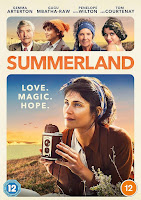 |
| (Amazon UK link) |
Gemma Arterton is Alice, the main character, a quirky, bad-tempered academic writer who lives in a cottage by herself, not mixing with any of the locals. It’s set during World War II but she ignores committees, blackouts and anything else that doesn’t interest her. She’s passionate about disproving folklore and myths by using science to explain unusual phenomena.
Unfortunately the local folk think she’s a witch - and she does nothing to dispel this idea. We see her in early scenes being abrupt, rude and tactless without, apparently, caring. And yet even then there’s a vulnerability in her eyes. She is lonely, though she refuses to admit it.
To Alice’s horror, a young refugee - an eleven-year-old boy called Frank (Lucas Bond) - is billetted with her. She has not offered her house, and hasn’t seen any correspondence relating to this - but then her mailbox is regularly filled with rubbish by local children. She does all she can to turn him away, but eventually, reluctantly, accepts him for a week, at most. She refuses to look after him, but he’s an intelligent outgoing child and gradually he wears down her defences…
There are some flashbacks to scenes a couple of decades earlier, when Alice was a student and involved in an unexpected love affair. We only discover, gradually, how this developed and how it ended; it’s perhaps related to her rejection of society norms and determination to stay secluded twenty years later.
The pace of the film is excellent, the acting believable, and the growing friendship between Alice and Frank is quite moving in places. The background of the war means that some tragedies are inevitable; we also see some of the negative prejudices against Alice that Frank experiences when he joins the local school.
‘Summerland’ is apparently a pagan myth, a kind of equivalent to heaven, or paradise, and Alice’s determination to explain some strange sightings form an important backdrop to the story.
We were drawn into the story immediately, and thought it an excellent film; it wasn’t at all predictable. There was one twist towards the end that felt like too much of a coincidence to be believable, but it was later explained. And while some of the myths are explained by science, the film leaves the feeling that magic still happens sometimes…
The film is topped and tailed with brief scenes showing a much older version of Alice, played by Penelope Wilton, set in the 1970s. She’s excellent in the role, but looks so unlike Gemma Alterton that I would not have guessed it was supposed to be the same character. So it’s a good thing that we see her at the beginning, grumpy as she’s interrupted in her typing, with the image fading into that of her younger self in the main part of the film. The actor who plays the adult Frank in a very short scene at the end is also entirely unlike the young Frank. However, these are my only very minor gripes. The final section set in 1970 is encouraging and positive, and is a good way of finishing off the story without lengthy explanations.
Rated 12 which I think is probably right; there’s minimal bad language, only a hint of intimacies in the flashbacks, and violence off stage, in incidents related to the war.
Our DVD has a couple of extras: interviews with the director and writer, Jessica Swale, and with Gemma Alterton. We thought them well worth seeing.
Review copyright 2023 Sue's DVD Reviews
No comments:
Post a Comment